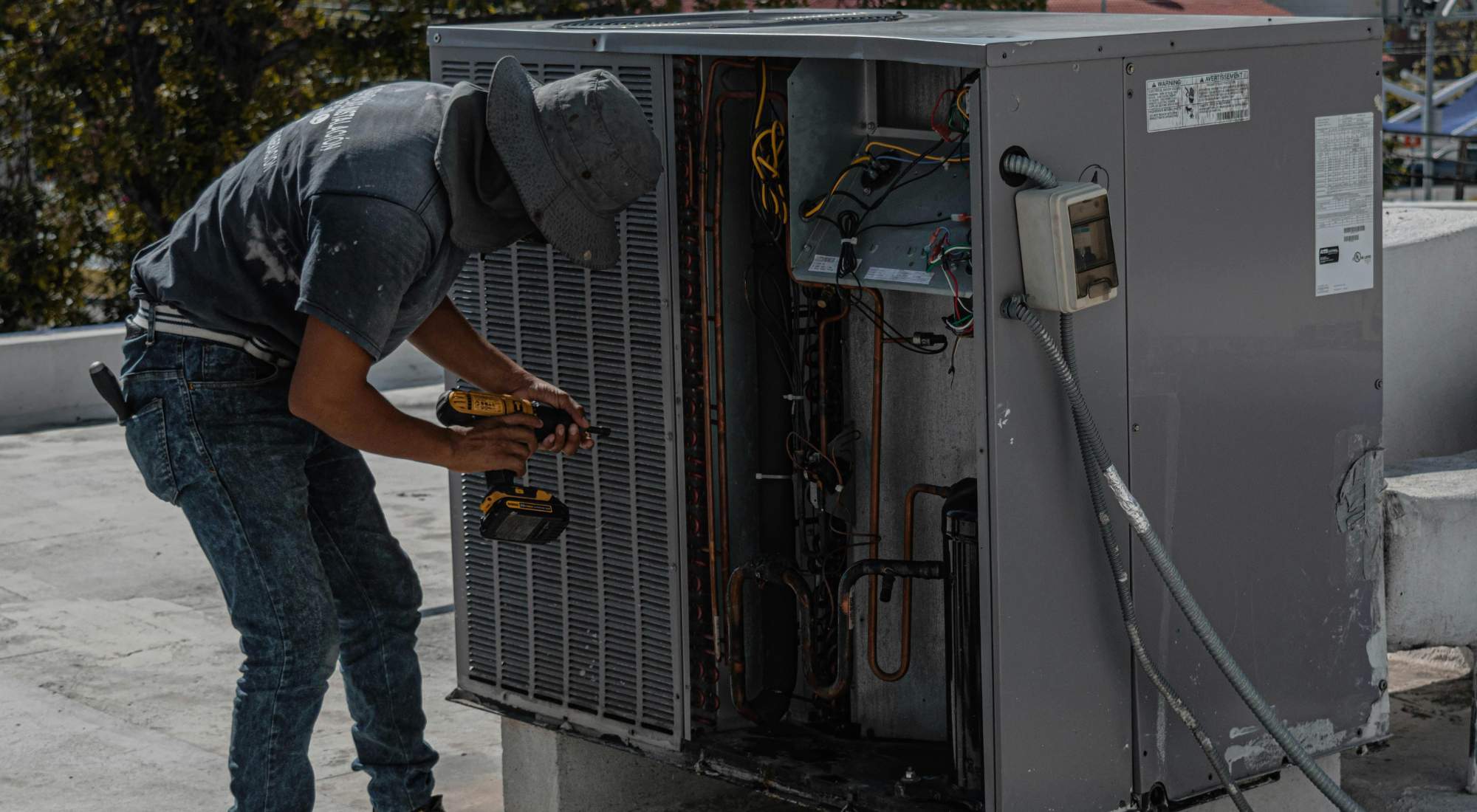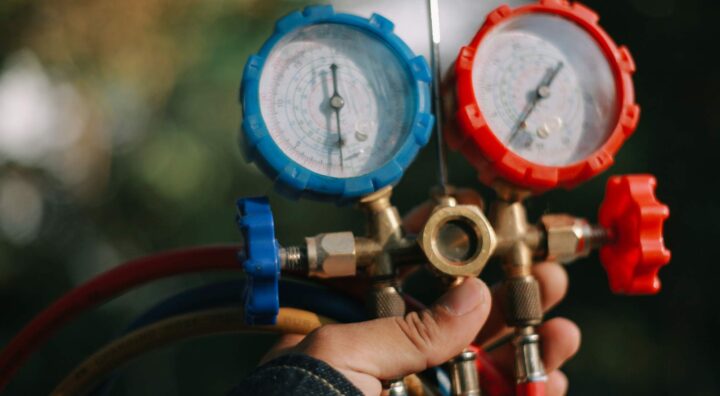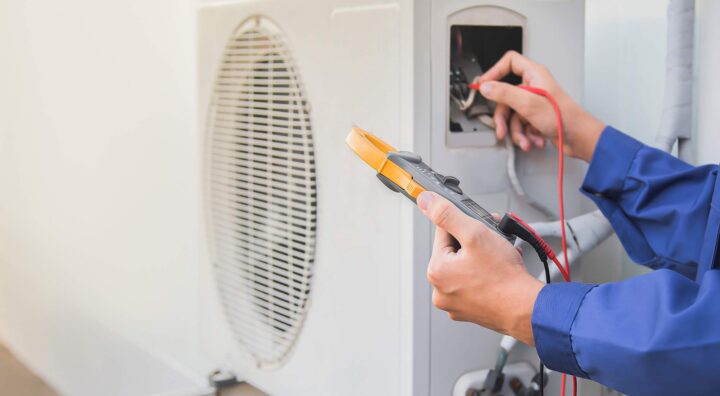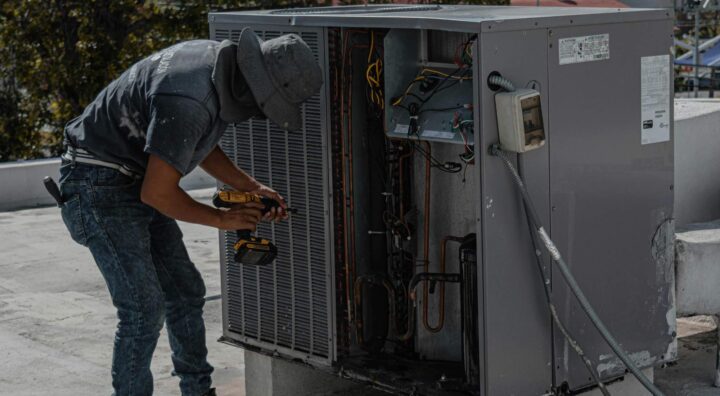
Summer is finally here. The sun is blazing and it’s a sweltering 95 degrees outside. You’ve been working in your yard and you’re sweating profusely. You walk inside your home expecting instant relief.
But instead of a blast of cool air, you get hit with a wave of lukewarm, humid air.
Why can’t your AC seem to keep up? Your HVAC system may be leaking freon (refrigerant).
If you find yourself in this predicament, we will tell you what signs to look for and how to remedy the situation.
Table of Contents
- How Do I Know if My HVAC Is Leaking Refrigerant?
- What Should I Do About an HVAC Refrigerant Leak?
- Can You Run an AC With a Refrigerant Leak?
- What Causes an HVAC Refrigerant Leak?
- How Can I Prevent an HVAC Refrigerant Leak?
- AAA Heating and Cooling: Ensuring Your HVAC Is Fully Functional

How Do I Know if My HVAC Is Leaking Refrigerant?
Summer isn’t the time you want to find yourself with an HVAC issue.
There are tell-tale signs that you could have an HVAC refrigerant leak:
- Your AC can’t seem to keep up with cooling your home.
- The air seems moist and humid.
- You hear unusual hissing, bubbling, or dripping noises.
- The coils appear to have ice or frost.
- There is an oily puddle or residue around the AC unit.
- Water is leaking.
- You smell an exhaust-like odor.
- A copper line or fitting has visible damage.
Feeling unqualified to diagnose your HVAC problems? It may be a good idea to seek a professional opinion. AAA Heating and Cooling has been serving the Portland Metro area for 62+ years and can assist you with your HVAC needs.
Slower Cooling
Is it taking hours or even days to cool your home? It may take a while to notice an issue with your HVAC unit if the leak is small. The larger the leak, the more noticeable the problem.
Maybe the air coming out of your vents isn’t cool at all.
If your HVAC seems to be lagging behind regularly, it needs to be checked out to determine if a freon leak is the problem.
Higher Electric Bills
Because your HVAC is working overtime to keep your home cool, it isn’t cycling off as often as it should. The continuous or frequent running of the unit consumes more electricity.
This means more money is coming out of your wallet.
If your kids haven’t continuously left the lights on all day, a higher utility bill is concerning. A huge spike in your energy consumption could be a sign that something may be wrong with your HVAC system.
Humidity
HVAC systems essentially work as dehumidifiers. As air moves over the cold evaporator coils, the moisture in the air condenses and changes into liquid that is collected and removed from the air.
If your house feels moist, you may need a dehumidifier. But if you have an HVAC system, you likely have a leak that has gone undetected.
Strange Sounds
The sounds of a properly functioning HVAC system are typically background noise in your day-to-day life. If it is particularly quiet, you might notice a clicking sound or a gentle blowing when the cooling cycle begins.
However, if there is an audible hissing or dripping sound, there is a problem.
Hissing or dripping is an indication there could be a hole or crack in the coils. Freon can easily escape from such flaws, affecting the unit’s ability to push out cool, comfortable air.
These holes or cracks can happen over time with typical wear and tear or exposure to the elements.
If you don’t see any holes or cracks but are hearing unusual sounds, you may need a professional to examine your HVAC.

What Should I Do About an HVAC Refrigerant Leak?
Once you’re aware of a leak, the situation must be remedied to prevent further damage. You don’t want to spend those hot summer days suffering.
The solution for repairing the unit depends on the cause of the leak.
The professionals at AAA Heating and Cooling have the expertise to assist you in finding the leak and determining the appropriate course of action.

Locate the Leak
There are methods you can use to find an HVAC refrigerant leak:
- Visual Inspection: Damage to the coils such as rust or cracks, noticeable frost on the coils or lines, oily residue, or puddles around the unit can help you find the freon leak.
- Listening: Hissing, bubbling, or dripping sounds (even when the unit is not running) are probable indicators of refrigerant leaks. Finding the source of the sounds will help you locate the leak.
- Soap Bubble Test: To use this method, prepare a solution that consists of one liter of water and 0.5 teaspoons of dish soap. Put the mixture in a spray bottle and spray the solution on the coils and lines of your unit. If any bubbles appear, then you have located your leak.
Additional ways HVAC refrigerant leaks can be detected by professionals include:
- Electronic Leak Detection: Electronic leak detection devices can be tricky to use without experience. Infrared devices use infrared light which gets absorbed by the leaking refrigerant. Ultrasonic leak detection devices are used to detect sounds that cannot be perceived by human ears to indicate a leak. Both types are more accurate than simply relying on human observation.
- UV Dye Test: With this method an HVAC technician will introduce a fluorescent dye into the unit. Any dye visible when a black light is shined over the coils and wires indicates where the leak is located.
Repair or Replace the Affected Part
Do you need a temporary, wallet-friendly fix by repairing the part and hoping you won’t have the same issue a few months down the road? Or would it be more cost-effective and offer you peace of mind to replace the damaged part?
Factors to consider when deciding to replace or repair include:
- Age: An older system is more susceptible to recurrent leaks. If your system is older it may make more sense to replace the part. If your system is newer and more efficient in general, choosing to repair the part may be the best option.
- Extent of the Leak: If the leak is extensive or leaks are occurring in multiple places, it may be beneficial to replace the part. If the leak is minor and isolated, it may be better to simply repair the leak.
- Warranty: If the unit is still under warranty, it would be logical to choose to replace the part because the replacement would be covered.
- Cost: When deciding to repair or replace a part, it is important to consider which is more cost-effective in the long run and which option fits your current budget.
Can You Run an AC With a Refrigerant Leak?
Refrigerant leaks can go undetected, but when discovered it is important to proceed with caution.
Turning off your HVAC system until repairs can be made is vital.
Continuing to run your HVAC system with a freon leak can exacerbate the damage. Not only can you cause bigger, harder-to-fix problems, but you can also unintentionally cause freon to be released into your home.
Inhaling or ingesting freon is incredibly dangerous for your health.
Exposure to freon can cause lung damage, long-term brain damage, and even death. Symptoms of freon exposure include:
- Breathing difficulty
- Severe pain or burning in the ears, eyes, nose, or throat
- Irregular heartbeat
- Skin irritation
What Causes an HVAC Refrigerant Leak?
Some refrigerant leaks happen over time due to normal wear and tear whereas others are a result of improper installation or defects in the system during manufacturing.
Factory Defects
You just upgraded the HVAC system. However, the HVAC isn’t performing optimally. It may have a manufacturing defect.
Most refrigerant leaks happen on or near the evaporator coil.
This part of the unit is responsible for heating the freon while the system is in use. If the coil came out of the factory with a pinhole or crack, this could result in a leak, reducing the functionality of your new HVAC.
Improper Installation
A shiny new HVAC unit won’t solve your AC needs if it isn’t installed correctly.
The unit must be placed in a flat, stable location with plenty of space around the unit for adequate ventilation. After the unit is in an appropriate location, the refrigerant lines and electrical wiring must be connected according to the manufacturer’s instructions.
Refrigerant lines connect the outdoor AC unit to the indoor evaporator coil which cools the air.
The refrigerant lines must be connected using compression fittings or solder joints and secured with tape or clamps to prevent the lines from becoming disconnected under pressure.
Natural Wear and Breakage
Just like any appliance, HVAC systems are subject to wear and tear.
The more the unit is used, the components will begin to wear out and the more likely leaks are to happen.
Excessive humidity and moisture can lead to corrosion of the pipes that lead from the evaporator coil to the outside of your home. The outdoor portions can also rust over time.
As your HVAC system works its magic, it produces vibrations. Vibrations are usually minimal in newer units, but as the system ages, they become stronger. The shaking can cause the fittings to become stressed.
If the fittings are not tight, freon can escape.
If the vibrations are strong enough, the lines can hit other parts of the unit such as the compressor, causing damage. Any crack or hole, no matter how small, can lead to a refrigerant leak.
Erosion
The copper coils and metal components of your HVAC are subject to erosion. As liquids move through the pipes and lines, over time erosion creates minuscule holes, allowing refrigerant to leak.
Erosion is a product of outdoor conditions such as prolonged exposure to moisture. Humidity can also cause erosion within the metal components inside your home if the levels are too high.
Household cleaning products can also contribute to erosion because they contain corrosive chemicals such as chlorides and fluorides.

How Can I Prevent an HVAC Refrigerant Leak?
While you cannot prevent everything that can cause an HVAC refrigerant leak, there are ways to be proactive in averting future leaks:
- Regular maintenance: HVAC technicians recognize signs of potential leaks before they happen. They can correct these issues promptly, avoiding malfunctions. Ideally, your HVAC system should be serviced annually.
- Replace the filter: Replacing the filter in your HVAC allows your home to have cleaner air and your unit to run efficiently, extending its lifespan. Dirty filters restrict airflow and cause your HVAC to work overtime, leading to more wear and tear and potential leaks.
- Clean the coils: Dirty coils hinder your HVAC’s ability to effectively cool your home. Dirt and dust act as insulation and don’t allow the heat to transfer properly or to remove humidity from the air, making your system work even harder and making the indoor environment less comfortable. Not to mention, clean coils will save you money if your HVAC is functioning efficiently.
AAA Heating and Cooling: Ensuring Your HVAC Is Fully Functional
If you find yourself asking, can an AC refrigerant leak be fixed? The answer is yes.
To save you the time and trouble of trying to find and repair the leak in your HVAC, the professionals at AAA Heating and Cooling are here to help if you live in the Portland Metro area.
We bring 62+ years of expertise and experience to the table when working to restore your HVAC to its proper functionality.
Let our family help your family overcome the stress and frustration of living with the summer heat.
